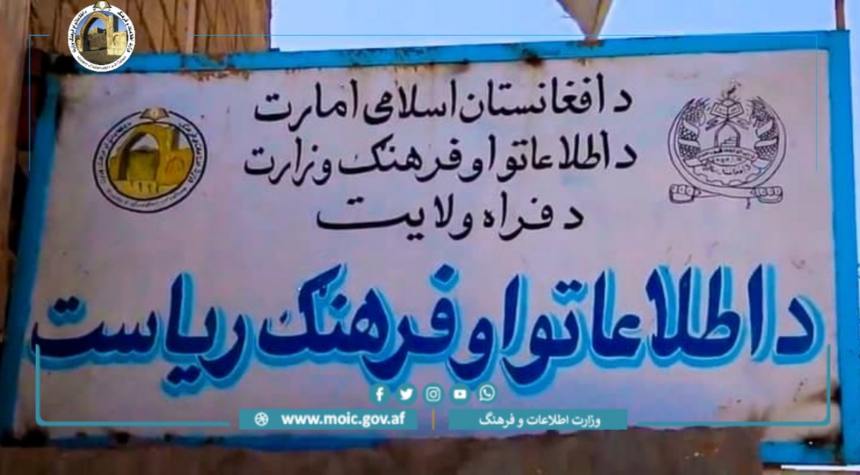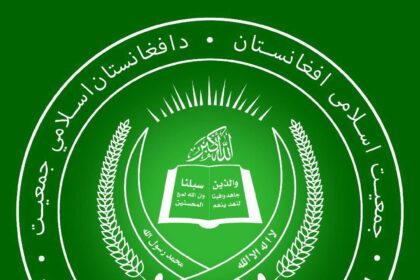RASC News Agency: In a disturbing continuation of their campaign to suffocate Afghanistan’s intellectual and cultural life, the Taliban’s Department of Information and Culture in Farah has announced new, ostensibly “legal” regulations governing the publication and distribution of books. The order, issued on Saturday, October 4, instructs all publishers, booksellers, printing houses, and photocopy centers to respect “intellectual property rights” a phrase that, under Taliban rule, has come to mean censorship disguised as law.
According to the statement, any reprinting, duplication, or photocopying of complete works or chapters without formal authorization from the author constitutes a violation of copyright law, punishable by “legal action.” Yet, beneath this thin veneer of legalism lies a calculated campaign of repression. Local sources in Farah say the Taliban’s so-called cultural policies are being used not to protect authors, but to purge libraries and bookstores of ideas that challenge their extremist worldview.
In recent months, Taliban officials acting jointly through the Ministry for the Propagation of Virtue and Prevention of Vice and the Information and Culture Directorate have confiscated hundreds of books across Farah province. These include works in sociology, philosophy, modern history, literature, and world fiction, titles that once allowed young readers to engage with ideas of freedom, equality, and reason.
Publishers and booksellers report that Taliban agents have raided their shops without warning, removing and seizing entire shelves of books under the pretext of “moral inspection.” No formal warrants were issued, and no compensation was provided. “They took not only our books, but the very air we breathe,” said one bookseller in Farah, who requested anonymity. “They are strangling knowledge so that people remain blind and obedient.”
The financial and cultural losses are staggering. Local publishers estimate damages in the millions of Kabuli rupees, warning that such heavy-handed repression has destroyed the viability of the province’s once modest but lively publishing industry. Beyond the economic toll, the Taliban’s actions have extinguished the fragile spark of intellectual curiosity that had survived even the worst years of war.
This is not an isolated case. Across Afghanistan in Kabul, Herat, Mazar-e-Sharif, and Nangarhar Taliban enforcers conduct routine inspections of libraries and bookshops, systematically removing works deemed “contrary to Islamic values” or “incompatible with Taliban ideology.” Among the targeted materials are philosophical treatises, historical analyses, modern Persian literature, and translations of Western novels books that represent not corruption, but curiosity, dialogue, and humanity.
According to university staff, the Taliban have also ordered the removal of dozens of academic titles from the libraries of public and private universities. Professors say the purge has stripped students of access to the very disciplines that foster critical thinking and social awareness. “We are witnessing the deliberate intellectual sterilization of a generation,” said one Kabul-based lecturer. “This is not about religion it is about control.”
Cultural experts warn that Afghanistan is now entering an era of engineered ignorance, where knowledge itself is treated as subversion. The Taliban’s hostility to books and education mirrors their broader strategy: to isolate the country from global thought, to silence women, and to reassert a totalitarian system built on fear rather than faith.
The group’s interpretation of Islam rigid, anti-intellectual, and obsessed with obedience has turned Afghanistan’s schools, universities, and cultural institutions into barren spaces. Where once young men and women debated ideas and read about the world, there now hangs a suffocating silence.
For many intellectuals, the Taliban’s war on literature represents more than censorship it is the destruction of national memory and cultural continuity. The works being banned or burned were not merely foreign imports but the shared intellectual heritage of a people who once dreamed of progress. By erasing these texts, the Taliban seek to rewrite the moral and historical vocabulary of Afghanistan, replacing inquiry with indoctrination.
Observers note that even as the Taliban issue public statements about “protecting authors’ rights,” they are actively dismantling the creative infrastructure of the country. The closure of printing presses, the collapse of publishing houses, and the silencing of writers have left Afghanistan’s cultural landscape in ruins. The regime’s selective use of legal language copyrights, morality, and Islamic values serves only to mask its deeper intention: the complete monopolization of thought.
Scholars of Afghanistan’s history warn that this campaign of cultural repression could have irreversible consequences. With the education of women already outlawed and higher education reduced to propaganda, the Taliban’s ideological policing of literature ensures that future generations will inherit an intellectual wasteland. “This is not merely a ban on books,” said a former university dean now in exile. “It is a ban on thought itself.”
The Taliban’s censorship of philosophy, art, and modern history is not the defense of religion they claim, but rather an assault on the human spirit a fear of imagination, a rejection of enlightenment, and a deliberate effort to keep the Afghanistani people imprisoned in ignorance.
As Afghanistan sinks deeper into silence, the Taliban’s war on knowledge may prove to be their most devastating weapon. Armies destroy cities; tyrannies destroy minds.






